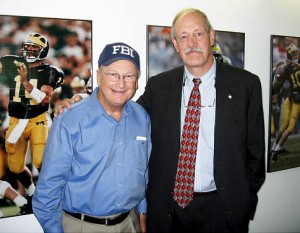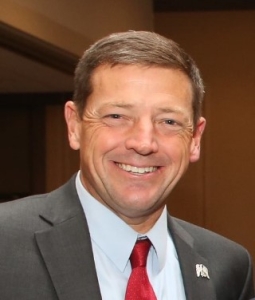
In 1982 legendary Michigan football coach Bo Schembechler called the FBI office in Ann Arbor. Bo wanted the FBI to talk to his team primarily about the perils of illegal sports gambling.
The Senior Resident Agent, Tom Love, agreed to make the presentation. Tom knew I had played (read mostly practiced) college football and asked me to help.
At the time Michigan’s football team was housed in a relatively small one story building that reminded me of a Quonset hut. Michigan’s transition from that modest building to the state of the art facilities they have today is emblematic of the change in Division 1 football in the last 30 years.
In our talk we explained how sports gambling worked. How it’s not about who wins. It’s about covering the point spread. How important it was for gamblers to get inside information as an edge to better divine how a team will perform, and if possible, have a cooperating player or ref with the ability to control the point spread, “point shaving.”
Sports gambling was and is a potential threat to the integrity of sports. The huge amount of money bet illegally in the US on sports is an incentive to gain an advantage in knowing or trying to control the outcome of a game. Recent estimates of the annual amount bet illegally in the U.S. are north of $300 billion.
When I started doing the FBI presentations, a D-1 college team, like Michigan, might be on TV once or twice a year. Now sports programing has become so pervasive that a dedicated fan or gambler can watch just about any game played anywhere in the country.
With the increase in TV coverage, sports gambling has also increased. And with the advent of the internet, gamblers have access to more current information and can place bets on-line.
Recognizing the need for educating players, the FBI developed a sports presentation program, and trained agents to address college and professional teams. After my first talk to the Michigan football team, I went through the training and attended periodic conferences with representatives from NFL, MLB, NHL and NCAA.
Over the years I’ve talked to pro and college teams. (I talked to the Michigan basketball teams several times including the “Fab Five” teams. That might have been a case of a failure to communicate.)
Something I didn’t always do, but learned was important, was to ensure that the head coaches stayed during the presentations. If the coaches didn’t think it was important enough to be there, the players would think the same thing.
The FBI program still exists in theory, but priorities have changed. It is no longer as active as it was, although sports gambling is bigger than ever and point shaving scandals continue to surface.
Our first talk with the Michigan football team must have gone well. Bo invited Tom Love and me back the next year. Tom was not as enthusiastic about speaking to the team as I was. So he told me to handle it on my own.
Little did I know that it was to be the “beginning of a beautiful friendship” between Bo and me. It was to have a substantial impact on my career.
Bo and I would work together on several FBI cases – notably the investigation of Norby Walters/Lloyd Bloom, two notorious sports agents who bribed and signed about 20 blue chip college football players while they were still eligible to play college ball. Walters and Bloom post dated the contracts and kept them secret, a clear violation of NCAA rules. Under NCAA rules, once you sign with an agent, your college eligibility ends.
Bo would be the “star” witness in the successful federal prosecution of Walters and Bloom. (Walters had been a New York music agent and had organized crime ties and a NY Mafia family helped finance Walters’ sports operation. It was believed that the ultimate goal of signing so many star athletes was to try to get some of the players in the stable to become involved in point shaving.)
Bo also convinced me –he was very persuasive — to pursue an undercover operation targeting the illegal trafficking of anabolic steroids. That UCO, Equine, was international in scope and resulted in the successful prosecution of over 70 dealers. (I’ve written several stories about Equine.)
Although illegal sports gambling continued to be the primary topic over the years, other concerns were discussed like: drugs, steroids, domestic violence (more specifically don’t beat-up your girlfriend) and recently the improvident use of social media. Obviously social media can also be a source of inside information for gamblers – makes you wonder how many star players’ twitter followers are professional gamblers.
The topics may have changed, but the message never really did. The common theme was using good judgment, having good values and making good decisions.
Bo had a concept of a “Michigan Man” (not meant to be gender specific). A Michigan Man not only demonstrated traditional values like integrity, honor and responsibility, on the field, but he/she lived them.
When Bo retired in 1989, I continued to talk to the Michigan football teams.
Later I was fortunate to become friends with Lloyd Carr during his 13 year tenure as Michigan coach. Lloyd reminded me of Jimmy Stewart, whereas Bo was more like George C. Scott playing General Patton. Both men led by example and practiced the values they taught.
During four of the seasons Lloyd coached (2000-03), my son was a walk-on. Those presentations were special for me. When I spoke to those teams, I was not only a FBI agent speaking to Michigan’s football team, but a father seeing his son in a group of men representing a program that I had come to respect.
This week I will again talk to the Michigan football team. Brady Hoke is Michigan’s coach now.
Before leaving to be head coach at Ball State and San Diego State, Brady was an assistant at Michigan under Lloyd Carr for 7 years (1995-2002). Brady has embraced the traditions of Michigan and the concept of the Michigan Man.
It is Michigan’s 133rd football season, and it will be my 30th year.
The topics have changed. There are still the perils of illegal sports gambling, but now there are the issues of social media: texting, sexting, twittering, etc. New problems, but the message stays the same: making good choices based on good values.
I always end my talks with a quote attributed to John Wayne: “Life is tough. It’s tougher if you’re stupid.”





